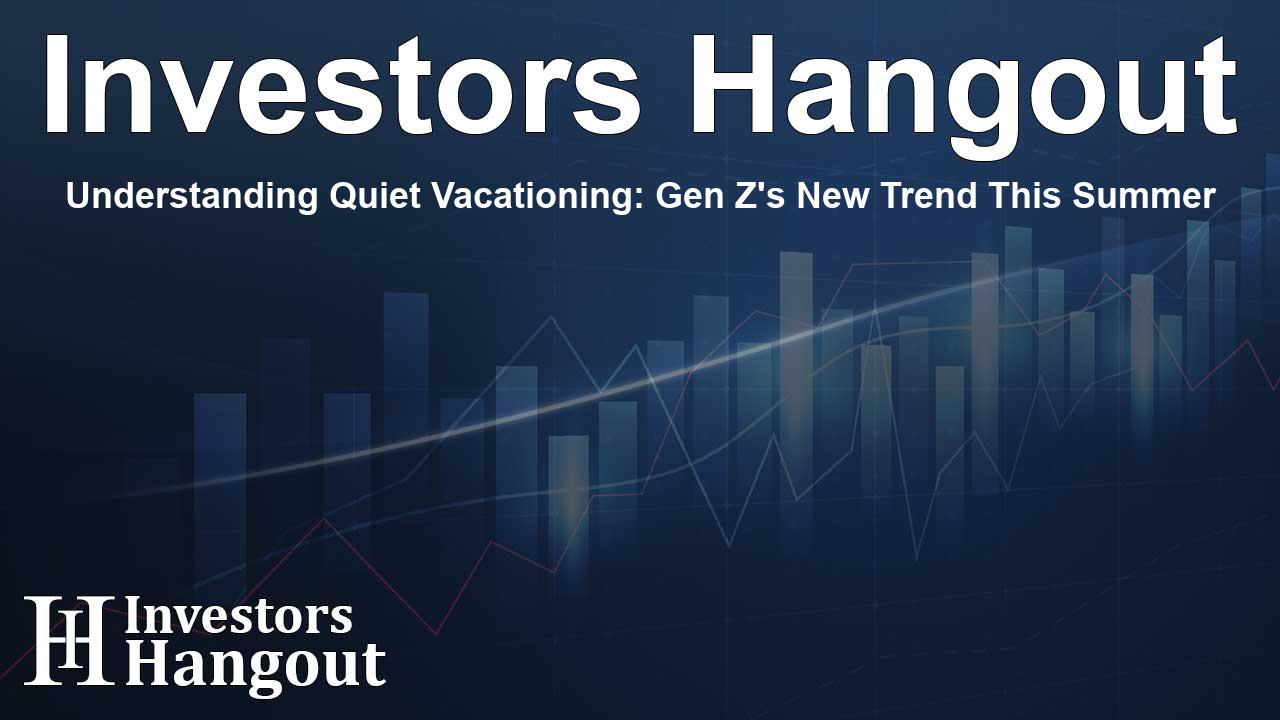Understanding Quiet Vacationing: Gen Z's New Trend This Summer

The Rise of Quiet Vacationing in the Workplace
As summer unfolds, a notable trend has emerged among employees, especially among the younger workforce. The concept of 'quiet vacationing' is becoming increasingly common, with many individuals opting to take time off without formally notifying their employer.
Survey Insights on Quiet Vacationing
A recent survey conducted with 1,200 full-time U.S. workers shed light on this developing phenomenon. The results revealed that approximately 41% of respondents have engaged in quiet vacationing during the year, signaling a shift in how employees perceive time off. Particularly, it was found that 66% of Generation Z workers have taken time off without communicating this to their superiors.
Reasons Behind the Trend
Several factors contribute to the rise of quiet vacationing. According to the survey, 33% of respondents described their primary motivation as saving paid time off (PTO) for future use. Many workers fear that taking time off could negatively impact their perceived dedication to the job, and others prefer not to use their official PTO at all. The insecurity around asking for time off, potential requests being denied, and feelings of anxiety around layoffs further complicate this issue. These sentiments reveal a broader workplace culture that may not fully support employee wellness.
Quiet Vacationing Among Executives and In-Office Workers
Interestingly, the tendency to quietly vacation is not restricted to younger employees; executives have also been known to engage in this practice. About 65% of executives surveyed admitted to taking quiet vacations. This trend highlights a potential disconnect between varying levels of management and employees regarding time off policies and flexibility.
The Impact of Quiet Vacationing
Despite the risks associated with quiet vacationing, many employees maintain the facade of working while away. A staggering 69% of participants indicated they continued to respond to emails, and 60% kept up with instant messages, even when not physically present at work. Such behaviors demonstrate the lengths to which employees will go to preserve their roles and responsibilities while trying to balance personal time off.
Responses to Virtual Meetings
During these quiet vacations, nearly two-thirds of those who participated in virtual meetings opted for virtual backgrounds to obscure their location. This behavior illustrates the intricate balance employees are trying to maintain between personal needs and professional obligations, further emphasizing the intricate dynamics at play in today's workforce.
Consequences of Quiet Vacationing
Even with the high percentage of quiet vacationers, it's noteworthy that 37% have faced consequences after their actions came to light. Some reported being denied promotions or key projects, while others faced the possibility of termination. Despite these repercussions, more than half expressed that they don't feel guilty about their choices. This lack of guilt may indicate a growing acceptance of these practices among workers, highlighting the need for companies to adapt their vacation policies and better support work-life balance.
About ResumeBuilder.com
ResumeBuilder.com serves as a valuable resource for job seekers, offering professional resume templates and career advice. With an emphasis on up-to-date resources and advanced tools, the platform empowers users to gain a competitive edge in the job market.
Frequently Asked Questions
What is quiet vacationing?
Quiet vacationing refers to employees taking time off without formally informing their employers, often while still performing work duties.
Why are Gen Z workers more likely to quiet vacation?
Gen Z workers may engage in quiet vacationing due to feelings of inadequacy about vacation days and a desire to maintain professional appearances.
What are the consequences of quiet vacationing?
Consequences can range from being denied promotions to receiving disciplinary action if employers discover the practice.
How does quiet vacationing affect work-life balance?
This trend disrupts traditional work-life balance, leading employees to blur the lines between personal time and work obligations.
What can companies do to support employees regarding vacation time?
Companies can reassess their vacation policies, promote an environment where taking time off is encouraged, and ensure employees feel supported in their need for personal time away from work.
About The Author
Contact Evelyn Baker privately here. Or send an email with ATTN: Evelyn Baker as the subject to contact@investorshangout.com.
About Investors Hangout
Investors Hangout is a leading online stock forum for financial discussion and learning, offering a wide range of free tools and resources. It draws in traders of all levels, who exchange market knowledge, investigate trading tactics, and keep an eye on industry developments in real time. Featuring financial articles, stock message boards, quotes, charts, company profiles, and live news updates. Through cooperative learning and a wealth of informational resources, it helps users from novices creating their first portfolios to experts honing their techniques. Join Investors Hangout today: https://investorshangout.com/
The content of this article is based on factual, publicly available information and does not represent legal, financial, or investment advice. Investors Hangout does not offer financial advice, and the author is not a licensed financial advisor. Consult a qualified advisor before making any financial or investment decisions based on this article. This article should not be considered advice to purchase, sell, or hold any securities or other investments. If any of the material provided here is inaccurate, please contact us for corrections.
